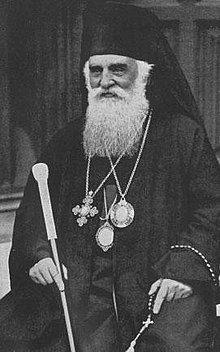Patriarch Miron of Romania
|
His Beatitude Patriarch Miron of Romania |
|
|---|---|
| By God's mercy, Archbishop of Bucharest, Metropolitan of Ungro-Vlachia, Locum tenens of the throne of Caesarea Cappadociae and Patriarch of All Romania Prime Minister of Romania |
|
 |
|
| Church | Romanian Orthodox Church |
| See | Bucharest |
| Successor | Patriarch Nicodim of Romania |
| Personal details | |
| Birth name | Miron Cristea |
| Died | Cannes, France |
| Buried | Romanian Patriarchal Cathedral |
| Nationality | Romanian |
| Denomination | Christian Orthodox |
| Miron Elie Cristea | |
|---|---|
| Prime Minister of Romania | |
|
In office February 11, 1938 – March 6, 1939 |
|
| Monarch | Carol II |
| Deputy | Armand Călinescu |
| Preceded by | Octavian Goga |
| Succeeded by | Armand Călinescu |
| Personal details | |
| Born | 20 July 1868 Toplița, Austria-Hungary |
| Died | 6 March 1939 (aged 70) Cannes, France |
| Nationality | Romanian |
| Political party | none |
| Profession | priest |
| Religion | Romanian Orthodox |
Miron Cristea (Romanian pronunciation: [miˈron ˈkriste̯a]; monastic name of Elie Cristea [eˈli.e]; July 20, 1868 – March 6, 1939) was an Austro-Hungarian-born Romanian cleric and politician.
A bishop in Hungarian-ruled Transylvania, Cristea was elected Metropolitan-Primate of the Orthodox Church of the newly unified Greater Romania in 1919. As the Church was raised to a rank of Patriarchate, Miron Cristea was enthroned as the first Patriarch of the Romanian Orthodox Church in 1925.
In 1938, after Carol II banned political parties and established a royal dictatorship, he chose Cristea to be Prime Minister of Romania, a position from which he served for about a year, between February 11, 1938, and his death.
Born in Toplița to Gheorghe and Domnița Cristea, a peasant family, he studied at the Saxon Evangelical Gymnasium of Bistrița (1879–1883), at the Greek-Catholic Lyceum of Năsăud (1883–1887), at the Orthodox Seminary of Sibiu (1887–1890), after which he became a teacher and principal at the Romanian Orthodox school of Orăștie (1890–1891).
Cristea then studied philosophy and modern philology at the University of Budapest (1891–1895), where he was awarded a doctorate in 1895 - with a dissertation about the life and works of Mihai Eminescu (given in Hungarian).
...
Wikipedia
